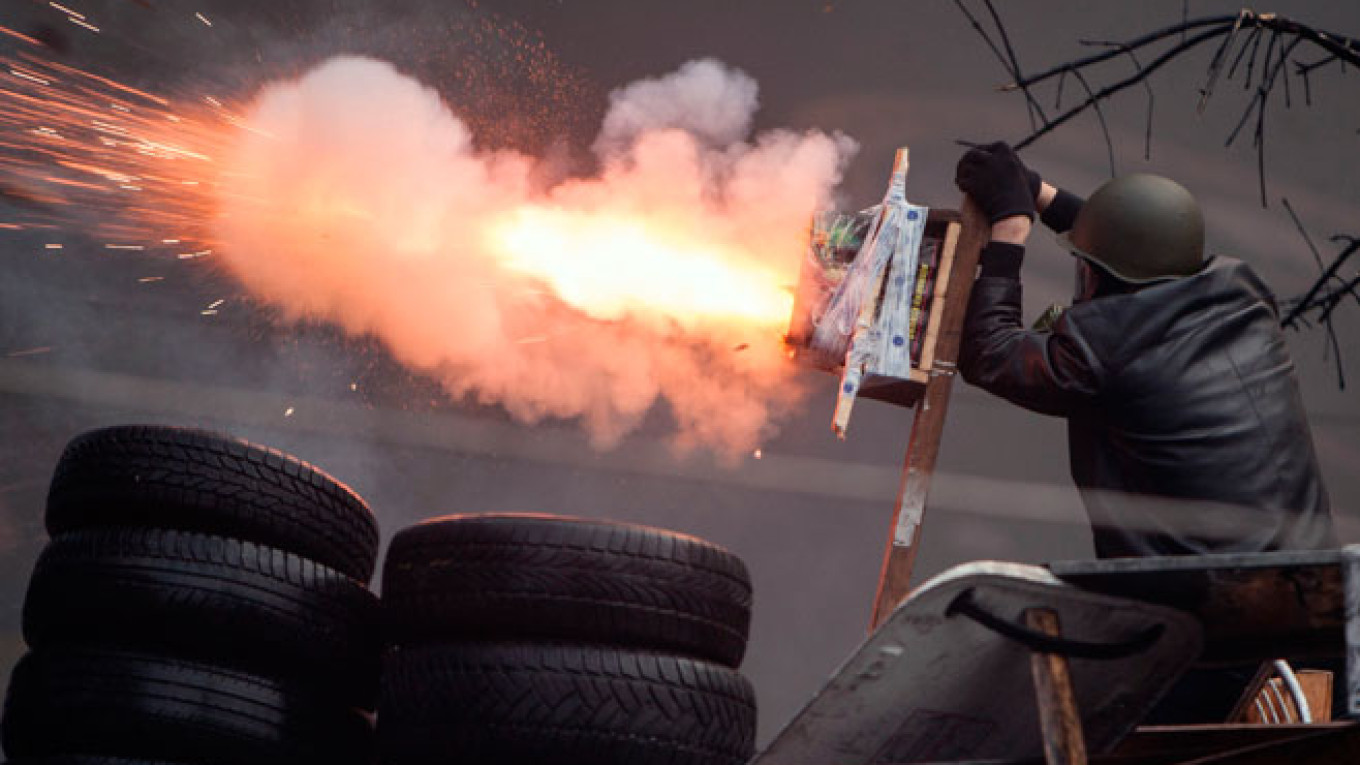President Vladimir Putin on Saturday ordered the withdrawal of Russian forces from the Ukrainian border, in what analysts saw as a move aimed at diplomatic tactical gain rather than long-term de-escalation.
"It total, it concerns 17,600 troops who participated in military exercises in the Rostov region this summer," presidential spokesman Dmitry Peskov said of the pullout, Interfax reported.
No independent confirmation of the withdrawal was available as of late Sunday.
The Russian troops were widely alleged to have been involved in the bloody pro-Russian uprising in the Donbass, a part of eastern Ukraine across the border from Russia's Rostov region.
Their pullout would come ahead of Putin's visit to a G20 summit in Australia next month and his meeting with Ukrainian President Petro Poroshenko in Milan on Friday.
Russia wants to defuse tensions ahead of Putin's diplomatic rounds, but this does not mean it intends to give up meddling in Ukraine, said Alexei Malashenko of Carnegie Moscow Center.
"They've pulled forces out before, but redeploying them is just as easy," he told The Moscow Times by telephone on Sunday.
Smoothing the Diplomatic Feathers
Pro-Russian insurgents battled Ukrainian troops the country's turbulent east from May to September, when the conflict subsided following the signing of a shaky cease-fire.
Moscow's alleged meddling in the infighting, as well as its annexation of Ukraine's Crimean peninsula in March, landed Russia in international isolation and triggered far-reaching economic sanctions from the West.
Tensions have decreased since the cease-fire's signing, and Western powers have spoken about lifting at least some of the sanctions, which have boosted inflation and capital outflow, and hampered corporate borrowing in Russia.
The meetings in Milan and in Australia's Brisbane are widely seen as Putin's chance to further patch foreign relations, said Vladimir Fesenko of the Penta think tank in Kiev.
The pullout of forces accused of direct involvement in Ukraine comes across as a well-timed publicity stunt, both he and Carnegie's Malashenko said.
"I think it's a tactical move, a show of Russia's willingness to de-escalate," Fesenko said.
But Putin's long-term plans for Ukraine remain unclear, which means a new "military exercise" could be launched at any given time in the Rostov region, Malashenko said.
"The conflict is continuing anyway. The cease-fire has been largely ineffective," Fesenko said.
The UN estimates 330 people have been slain in the simmering conflict since the cease-fire, bringing the total death toll to 3,660.
The warring parties agreed last week on a 30-kilometer buffer zone between their positions, which is to be free of heavy armaments, but that has not stopped the fighting.
Putin is caught between a rock and a hard place on Ukraine because Russia's alleged support of the separatists has catapulted his approval ratings at home to record highs. Any de-escalation move would improve Putin's international standing, but at the cost of support at home, and vice versa, analysts said.
The rebellion also remains an important source of leverage against Ukraine for Putin, who is struggling to keep Kiev from aligning with the West, including by fueling strife in Ukraine, both experts said.
War on Vacation
Russian continues to deny offering direct military help to the flagging insurgency, which unexpectedly routed the prevailing Ukrainian army in August.
But a wealth of evidence indicates that a limited contingent of Russian servicemen — estimated by NATO at 1,000 — played cavalry galloping to rescue the besieged rebels.
Western officials and Russian investigative reports said the Russian troops involved in the fighting came from the "military exercise" in the Rostov region.
One detachment of Russian troops involved in the exercise was captured in the Ukrainian war zone in August. They claimed to have lost their way, straying across the border by mistake.
Russian state media and rebel leaders also said Russian servicemen fought for the insurgency on their vacation time — for which the servicemen would have to be authorized by their superiors.
Russia's denials are also undermined by its admission that it used the military to take control of Crimea during the annexation. Putin explicitly denied their involvement until the takeover was completed.
Contact the author at a.eremenko@imedia.ru
A Message from The Moscow Times:
Dear readers,
We are facing unprecedented challenges. Russia's Prosecutor General's Office has designated The Moscow Times as an "undesirable" organization, criminalizing our work and putting our staff at risk of prosecution. This follows our earlier unjust labeling as a "foreign agent."
These actions are direct attempts to silence independent journalism in Russia. The authorities claim our work "discredits the decisions of the Russian leadership." We see things differently: we strive to provide accurate, unbiased reporting on Russia.
We, the journalists of The Moscow Times, refuse to be silenced. But to continue our work, we need your help.
Your support, no matter how small, makes a world of difference. If you can, please support us monthly starting from just $2. It's quick to set up, and every contribution makes a significant impact.
By supporting The Moscow Times, you're defending open, independent journalism in the face of repression. Thank you for standing with us.
Remind me later.


